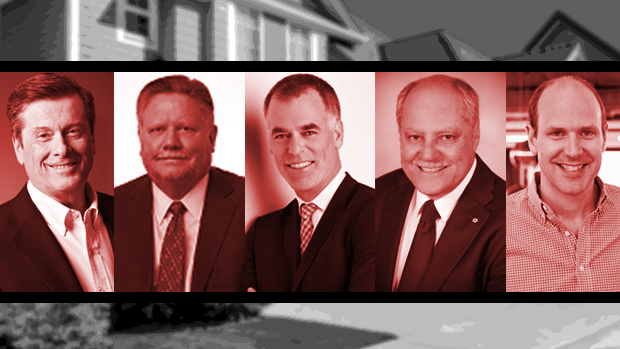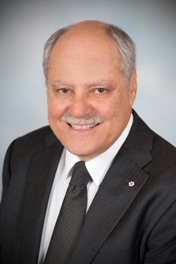
Bankers Doing Bond Deals Caught Out by New Era of Issuer Clauses
Message to bond underwriters: Some big customers are sizing up your ESG credentials.
Latest Videos
The information you requested is not available at this time, please check back again soon.

Message to bond underwriters: Some big customers are sizing up your ESG credentials.

Joe Biden’s allies are racing to blunt the presidential campaign of Robert F. Kennedy Jr., casting his third-party effort as a stalking-horse bid designed to boost Donald Trump’s chances — even as his wide-ranging policy positions make him a threat to both.

Chengdu, a major city in the southwest China, removed home-buying curbs, joining dozens of peers in the country in an attempt to revive real estate demand and boost economic growth.
China Vanke Co. made a rare response to Moody’s downgrade last week, citing support from financial institutions and its biggest shareholder.

Billionaires who built their fortunes rolling out wireless networks when debt cost almost nothing are seeing their wealth crimped by higher borrowing costs and caution among money managers on the outlook for the industry.
Aug 12, 2016
, BNN Bloomberg

Canadians looking to buy their first homes seem to face an impossible dream these days, but the leap into property ownership has never been easy – even for those who have done it with great success.
First-time buyers today are dealing with skyrocketing home prices in Vancouver and Toronto, the apparent threat of foreign buyers and years of low interest rates. But what challenges did others face years before?
BNN asked Canadian business leaders to share their stories about buying their first homes, and the lessons they would give to those on the property hunt today.
John Tory, Mayor of Toronto, and former Rogers Cable and Rogers Media CEO
Tell us about your experience buying your first home.
“The most important thing I remember – and when you mention this nowadays to people today they think you’re making it up – is that it had a mortgage rate of 10 per cent. At that time [in 1980], it was the lowest mortgage we rate we had. Right after that, rates went up close to 20 per cent.
We bought our first house in north Toronto. Before that, we lived in an apartment. The second bedroom in it was this tiny little room, so once we had a second child we ran out of space.
I had just started working as a lawyer and my wife was still a student, and I asked [the bank], how much money would you lend me? They told me how much they’d lend me based on the maximum, and I said fine. I had been advised by my law colleagues who were older and they said that you should go out and borrow as much as you can from the bank to buy as much house as you can. They said it’s the only tax-free investment you get, and you’ll appreciate it later because houses will appreciate in value, which turned out to be true.”
What advice would you give first-time homebuyers today?
“I think most people do this nowadays – especially at low interest rates – is to borrow as much as you can, but responsibly, to afford to buy a house that’s as nice as it can be. I also think people should just get on with it – I know Kevin O’Leary has said that people should rent instead. Another piece of advice that’s much more relevant now, is to buy a house that you think you’re going to stay in for a long time because the cost of moving is so huge. And by that I mean the real estate fees, legal fees and the government taxes, including the ones that come to [the City of Toronto]. If you add up the cost of moving it’s hugely expensive. Buy in a place where you’re going to be satisfied in terms of the neighbourhood, the school. Look ahead, look well ahead.”
Stephen Letwin, CEO of Iamgold Corp
Tell us about your experience buying your first home.

“We bought our first home in Calgary in 1980 at the top of the oil boom, for a ton of money for the size that we got. We went in at 11 per cent mortgage rates, which doubled in the next three years. We were locked in with a five-year mortgage. Calgary was decimated as oil prices fell in the years that followed. Many handed over the keys and walked away from their mortgage, but we kept our house, lived through it and survived through so much value destruction… I feel for Calgary today, which is going through the same thing today.”
What advice would you give first-time homebuyers today?
“Make sure you don’t become house poor and that you can survive financially through both good and bad times. It’s a mistake to buy more than you can afford – it puts pressure on your relationships, on everything.”
Mike McDerment, co-founder and CEO of FreshBooks
Tell us about your experience buying your first home.
“I bought my first home in 2014 in High Park [in Toronto’s west end]. The truth is, I'd been talking about how inflated the housing market was in the years prior to that. But then, I got married and was told we’re buying a house. It turns out I was the fool, because prices in our neighbourhood have been going up aggressively, about 30 per cent since we bought.

It's been great – we bought a great home that we can reasonably manage. It's a 100-year Edwardian house with four bedrooms. I like our home, but at the same time, I'm not going to gush about an object. I don't see us moving until it's the right thing for our family. We're here for a while, we have a renter in the basement and there's a lot of runway for what we're doing.”
What advice would you give first-time homebuyers today?
“Make sure you can afford your house even if interest rates change. This is historically a very unusual interest-rate environment, and when they change it could cause a lot of pain. Lots of people are mortgage poor. But in our experience, I was over the age of 35 when we bought our house and my wife and I had been saving for some time. So we put down a good down payment and had a reasonable mortgage. You don't want to be forced to sell when prices are less than what you pay for.”
Peter Simons, CEO of La Maison Simons
Tell us about your experience buying your first home.
“The first time I bought was in 1993, before there was really more real estate inflation. It was in the downtown urban core in Quebec City’s Montcalm area, right by the Plains of Abraham. It was a beautiful old home that had seen better days, and I renovated it myself. It was an interesting experience living in a house that you’re in the process of renovating after work every day. I have fond memories of it and it’s always nice building something, and bringing something back to life.

“I remember paying a price that a lot of people said, ‘Oh you’re crazy.’ But the price doubled three or four years later. I remember the renovation being very expensive. But that home had good capital appreciation. I brought value to it by doing a quality renovation job.”
What advice would you give first-time homebuyers today?
“I wouldn’t stretch myself on a home. I know it’s very difficult and there are markets with high inflation. But you should stay within your means because the house isn’t going to define you – it’s the people and what’s inside, and the relationships within a home. Perhaps we’re too focused on the material, physical aspects of a home, and we should maybe downsize a bit and focus on what’s in the home.
There’s certainly going to be a new evolution of urban density for environmental reasons, in our larger cities. I think If I were young today, that’s what I’d be looking at, trying to redefine and do something very unique. Look at something that’s compact and more urban, that can create a quality of life, in a denser urban setting.”
Ellis Jacob, president and CEO of Cineplex
Tell us about your experience buying your first home.
“I bought my first home in Thornhill, Ont., and it was in a relatively new development and I bought it in 1979. I was 26 at the time. When I looked at [the housing market] then, I thought it was expensive, like everybody does. The mortgage rates were significantly higher than they were today – in the 10 to 11 per cent range.

The reason I ended up buying the house was because my wife and I went to visit a cousin in San Francisco, and the first question she asked me was, ‘Are you in a house?’ I said, ‘No no, we’re staying in a rented apartment.’ And she said, ‘This is a bad idea. You should go back home and buy yourself a property.’ She said, ‘I know you’re going to find it hard, but stretch yourself, do whatever you have to do. In the long run, it’s a good way to save money and it’s an asset that will appreciate while you live in it.’
So I took her advice and came back, and I felt like I spent a monumental amount of money when I bought my first house. I think it was about $113,000. It was a small home. Her advice paid off handsomely because I was then able to sell it and move into a bigger house once we had our kids. But now I’ve gone 360 [degrees] and we’re back in a condo.”
What advice would you give first-time homebuyers today?
“I think it’s important to make sure you can afford the house and that you buy something that you’re comfortable with. And if you need to stretch, stretch a little bit, because in the long term it’s a great asset to hold. Take advantage of today’s interest rates because back then, they were significantly higher.”